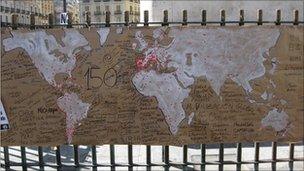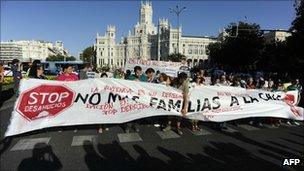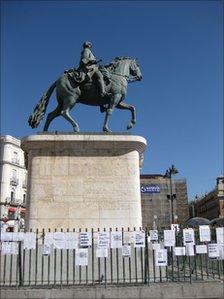Spain's 'Indignants' lead international protest day
- Published

Spain's "indignant" movement hopes 80 countries will join their protests.
Five months after the first mass rally in Madrid, the "Indignant" protest movement is back. Activists are mounting an international day of protest on Saturday under the slogan: "Unite for global change."
At least 60 rallies are planned across Spain, where the movement was born out of anger at the influence of powerful financial institutions over policy-making, and the impact of Spain's deepest economic crisis in decades.
Dubbed 15-M, after its birth date on 15 May this year, it has since inspired similar movements from Israel to America, with events planned this weekend in more than 80 countries.
But sceptics say beyond the rallies themselves, the movement has had little impact.
"We are fighting for a global revolution. We don't believe the world should be this way and we want change," said Martha, one of several dozen people painting protest banners this week at a Madrid city squat.
One multi-coloured slogan declared: "The power is in the plazas!"
Another poster painter, Amaya, said the movement was spreading.
"You can see the impact now in Israel, on Wall Street, in London. We are all suffering the same things - the cutbacks. And we're coming together."
Peaceful uprising
The internet is full of video clips calling crowds onto the street all over the world, or offering pre-prepared posters for less artistic activists to print out and carry.
There is a manifesto too, in 18 languages, pronouncing a popular, peaceful uprising, for what it calls a "true democracy".
"We are not goods in the hands of politicians and bankers who do not represent us," the manifesto states.
In the Spanish capital, Madrid, eight separate columns of protesters plan to march on the city centre from all directions.
They will converge on Sol square - Puerta del Sol - where the original protest in May became a spontaneous sit-in, that morphed into a sprawling protest camp, lasting for weeks.
The camp occupied a large chunk of Puerta del Sol and included everything from portable toilets to a kindergarten and a library.
It eventually produced a long list of demands including electoral reform, an anti-corruption drive and the protection of public health and education services.
Limited impact
Yet in spite of initial widespread sympathy and support, the impact of 15-M appears limited.
"Political movements have to be measured against their demands, and I can't think of a single measure the government has taken or the opposition proposed that meets their demands. So you have to say it's a failure," said political analyst Miguel Murado.
"It doesn't matter if they gather 70,000 people or 100,000 - if there's no impact, there's no impact," he said.
Instead, national and regional governments have ushered in further austerity measures and cuts since May.
Most controversially, hospital beds and some clinics are being closed in cash-strapped Catalonia.
Elsewhere, cuts in spending on supply teachers have sparked a wave of strikes.

The Indignant movement has campaigned against evictions of those who cannot pay their mortgages.
And this summer's fast track constitutional reform to set a ceiling on public debt was a blow to the 15-M demands for a more participative democracy.
Fighting evictions
The movement has though, been particularly active in fighting evictions.
With a record number of house repossessions, activists have called protest "flash-mobs" and stalled 83 evictions so far.
They argue low-income families were tricked into "junk" mortgages they could never afford.
But their campaign to allow homeowners to wipe out their debt by handing over their house keys to the bank, has been ignored.
"The biggest change we've achieved is not so much political or economic - it's a change of consciousness, a social awakening," argued Juan Lopez, who joined the protest movement at the very start in Sol.
At the time, like many of the mainly young protesters, he was unemployed.

"Indignant" banners have begun to appear again.
"Before, we were at home alone with our problems. Now we see we have the support of many people and we can try to create solutions," Juan said.
After the main camp in Sol was disbanded, 15-M assembly meetings have continued each week in many neighbourhoods, debating and attempting to affect smaller, local level change.
The protest this Saturday is an attempt to breathe new life into the movement, and to test its global support.
Protest camp
In Sol square, "Indignant" banners have started to appear again on the railings, declaring the motives for Saturday's rally: "Because without your voice, there's no democracy," and, "Because life is passing, but not the crisis."
With a general election due to take place on 20 November, there is speculation that the rally could turn into another, long-term protest camp, in an attempt to influence the political agenda.
"They're free to demonstrate of course, but I think this is more of a game than something serious," one man passing through Sol suggested.
"I don't think they'll have any impact on politics," he said.
But a woman passer-by disagreed: "It's good this is happening because the problems are still there. Lots of people are still without work.
"I think it's important not to give up," she said.
- Published14 October 2011
- Published23 August 2011
- Published29 July 2011
- Published27 July 2011
- Published21 June 2011
- Published21 May 2011